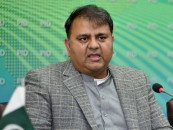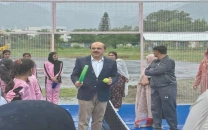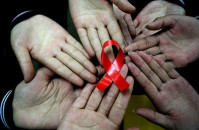101 things you’ve always wanted to ask about the police

If he comes across somebody being robbed, he is duty-bound to help them, explains point No 41 of the Shehri- Citizens for a Better Environment’s (Shehri) booklet. Titled 101 Things You Wanted To Know About The Police But Were Too Afraid To Ask, the booklet is an attempt to change the ambivalent relationship of people and the police. It was launched on Thursday at the Beach Luxury Hotel with former editor of the Herald Sherry Rehman as chief guest.
The brightly coloured and simple text starts with the very basic question: why do we have a police force. It covers the structure of the force, their duties towards the public and the public’s duty towards them, what people can do in case the police commit an offense and a detailed overview of the police force’s rights and responsibilities. The language is simple and interspersed with caricatures and cartoons. The Commonwealth Human Rights Initiative (CHRI) and the National Endowment for Democracy (NED) came up with the idea for this booklet in an effort to promote democracy. “We want people to understand what their rights are,” said Sanjay Patil, programme officer of the CHRI.
“The crux of the issue is that people who are in power need to understand that police are meant to benefit the public not to oppress them.” According to him, the gap between the police and the public is not just felt in Pakistan but in all the developing countries. He describes this as a ‘leftover legacy of the colonial era’. International NGOs are focusing on this problem and considering it part of the fight for human rights, Patil explained. For Shehri, a nonprofit organisation working for a better environment, the attitudes of police and people towards one another is a big obstacle in creating a healthier atmosphere in the city.
“Changing their [police and people] negative attitudes is a necessary step in improving the prevailing environment of mistrust and non-cooperation,” said Shehri’s general secretary Amber Alibhai. The booklet is part of a larger campaign to improve the police-public relationship. The campaign also includes training workshops, that Shehri organised in Karachi, Hyderabad and Islamabad. Scores of police officers received training in human rights issues.
Talking to The Express Tribune, a police officer said that she learnt a lot about the issues of women and children and the way to deal with them. “I’m a woman but I still did not realise the violations we often end up committing while dealing with people,” she said, adding that the experience had been ‘an eye-opener’.
According to Rehman, who is also the former information minister, people are quite used to the negative side of the police, with videos of police flogging and torture coming out in the open. She also commented on how policing was a ‘thankless task in Pakistan’. Shehri master trainer Gulmina Bilal expressed optimism for the project as a whole. “We have have expanded the programme across the country and are now in touch with the IGs of all provinces,” she said.
Published in the Express Tribune, May 14th, 2010.



















COMMENTS
Comments are moderated and generally will be posted if they are on-topic and not abusive.
For more information, please see our Comments FAQ